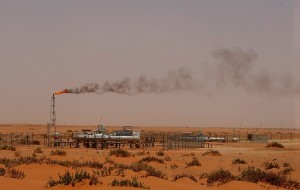
A flame from a Saudi Aramco oil installion known as “Pump 3” is seen in the desert near the oil-rich area of Khouris, 160 km east of the Saudi capital Riyadh, on June 23, 2008. As high oil prices and improved efficiency force refineries in the US and Europe toward closure, the industry is shifting toward the Middle East and Asia in a move fueled by a thirst for energy among emerging economies. AFP PHOTO/MARWAN NAAMANI
JUBAIL, Saudi Arabia—As high oil prices and improved efficiency force refineries in the US and Europe toward closure, the industry is shifting toward the Middle East and Asia in a move fueled by a thirst for energy among emerging economies.
China and India in particular are driving the demand, with multiple refineries cropping up in China and the Gulf and Indian energy group Reliance, for example, running two giant refineries capable of processing a total of 1.2 million barrels of crude oil per day.
In eastern Saudi Arabia, state oil group Aramco – the world’s largest – and French counterpart Total are putting the final touches on their Jubail site, which will open next year as one of the world’s biggest refineries.
The refinery, located in the desert about 30 kilometers (20 miles) from the Persian Gulf, will be able to process 400,000 barrels of crude oil per day and will be fully operational by the end of 2013.
For Total, the project “is very important for our future, because we were everywhere in the Middle East, except here, and it’s a way of paving the way for the company,” Total’s head of the refining and chemicals division, Patrick Pouyanne, said on a tour of the site this week.
Total’s expansion to Saudi Arabia comes as the energy group and others reduce their presence in Europe, with Total closing its Flanders plant in northern France in 2010 and Swiss refiner Petroplus shuttering its Reichstett plant last year.
Since 2003, Total has slashed its refining capacity on the continent by 24 percent, while Anglo-Dutch oil giant Shell and British energy group BP have reduced theirs by 40 percent.
Driving the phenomenon is an increase in oil prices that has dampened fuel sales and made fuel oil a less competitive option for heating than gas.
“The problem is present everywhere in Europe, it’s a strong trend that won’t abate,” refining expert Constancio Silva from the French institute for oil and new energies (IFPEN) told AFP.
“We’ll consume less oil and in a more efficient manner, and that leads to a reduction in refining capacity,” he added, saying the situation was mirrored across the Atlantic.
“In the United States as well, there are shutdowns and key changes among refineries, and this year we witnessed the largest reduction in capacity,” he said.
He added that the cropping up of new refineries in the Middle East is only aggravating the problem, as the sites compete with their European counterparts.
Total said that while the group hopes to beef up its presence in the Middle East, it will still keep its European refining sustainable.
“There are still refining overcapacities in Europe and they’ll have to be reduced. But streamlining doesn’t necessarily mean shutting down, but also better managing what exists, or producing less to produce better,” Pouyanne said on his tour of Jubail this week.
He cited as an example the company’s heavy investment in its Seine-Maritime refinery in northern France to adapt it to the change in demand and said certain European sites could also be pooled together.